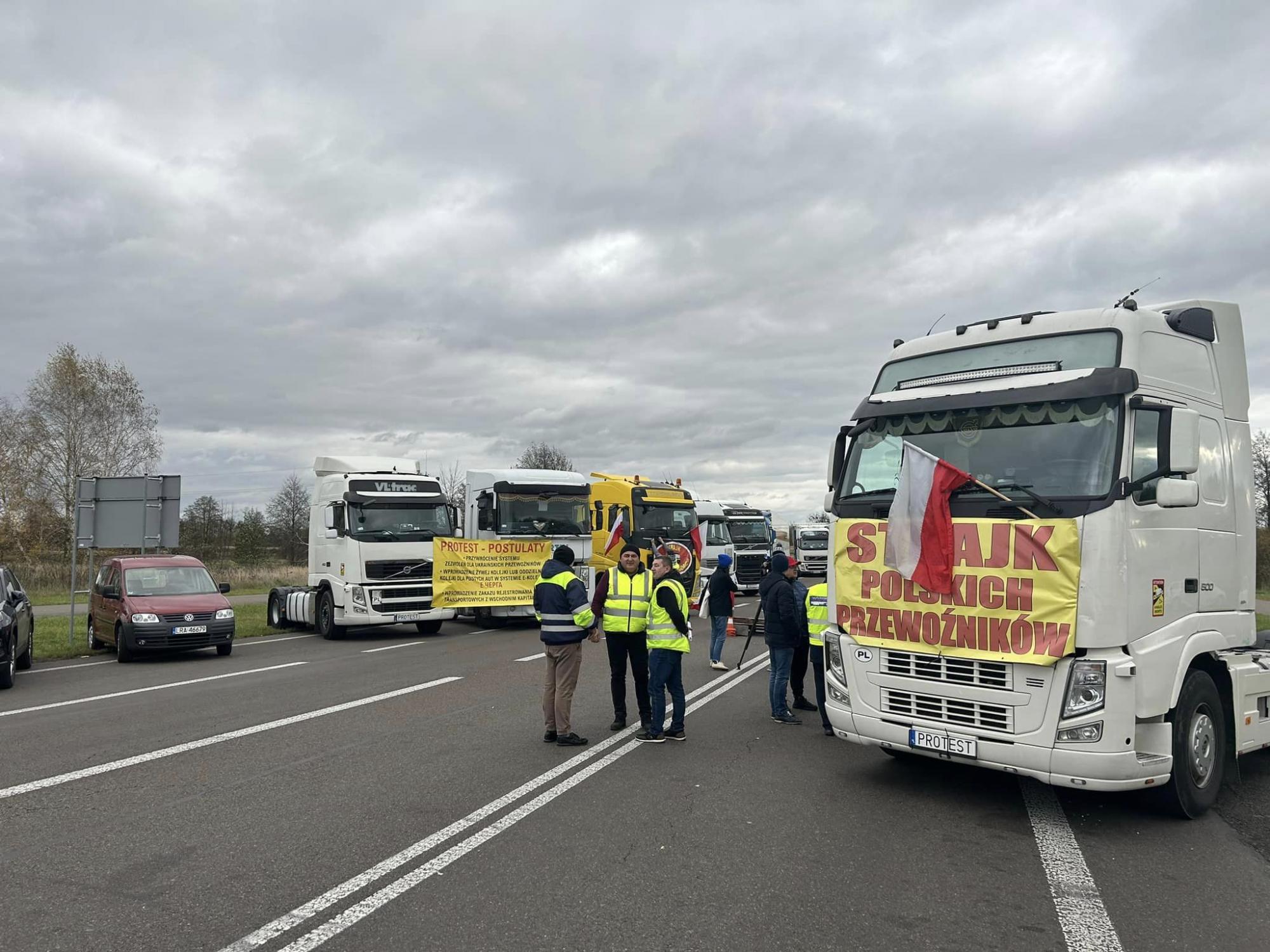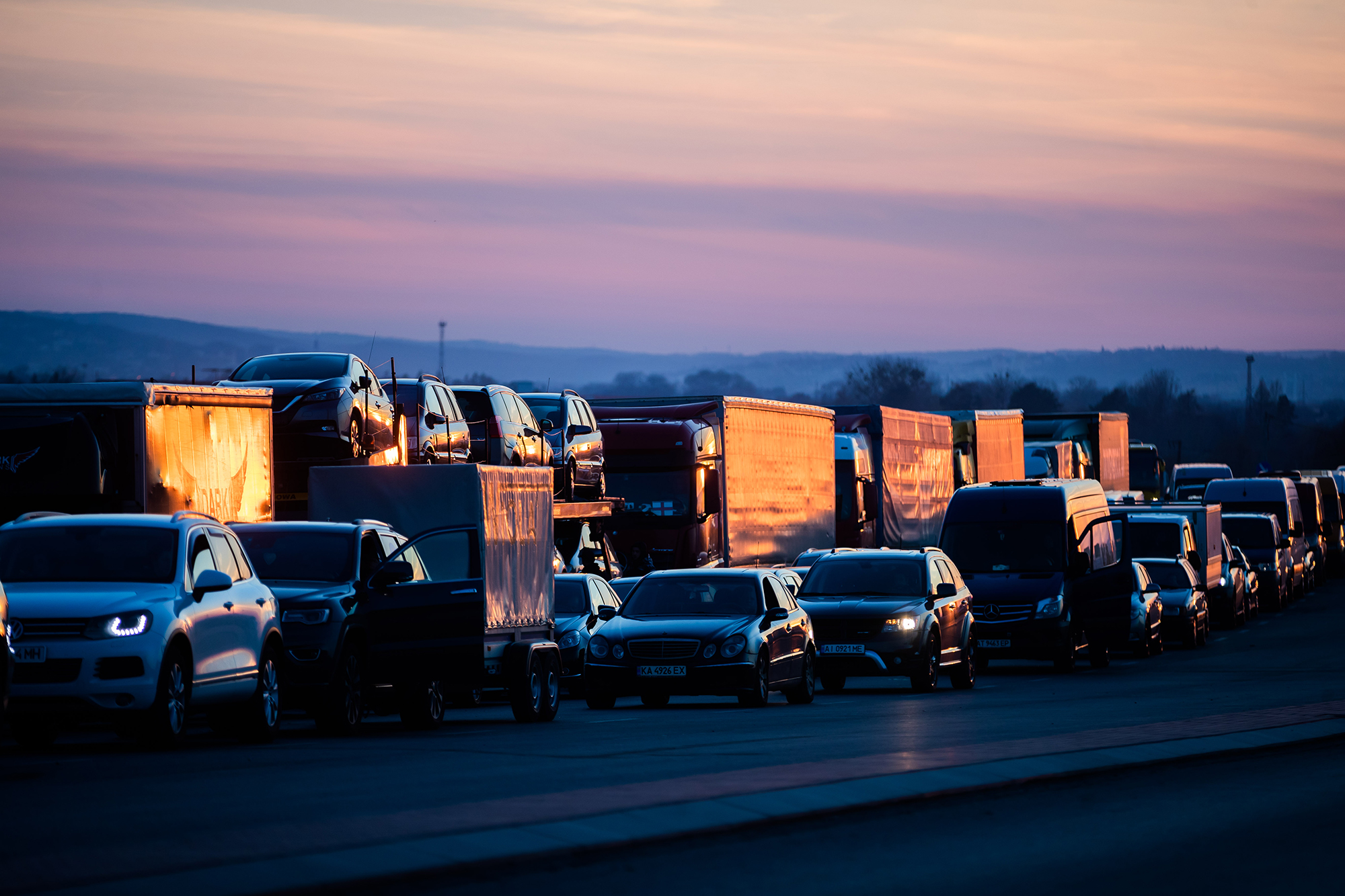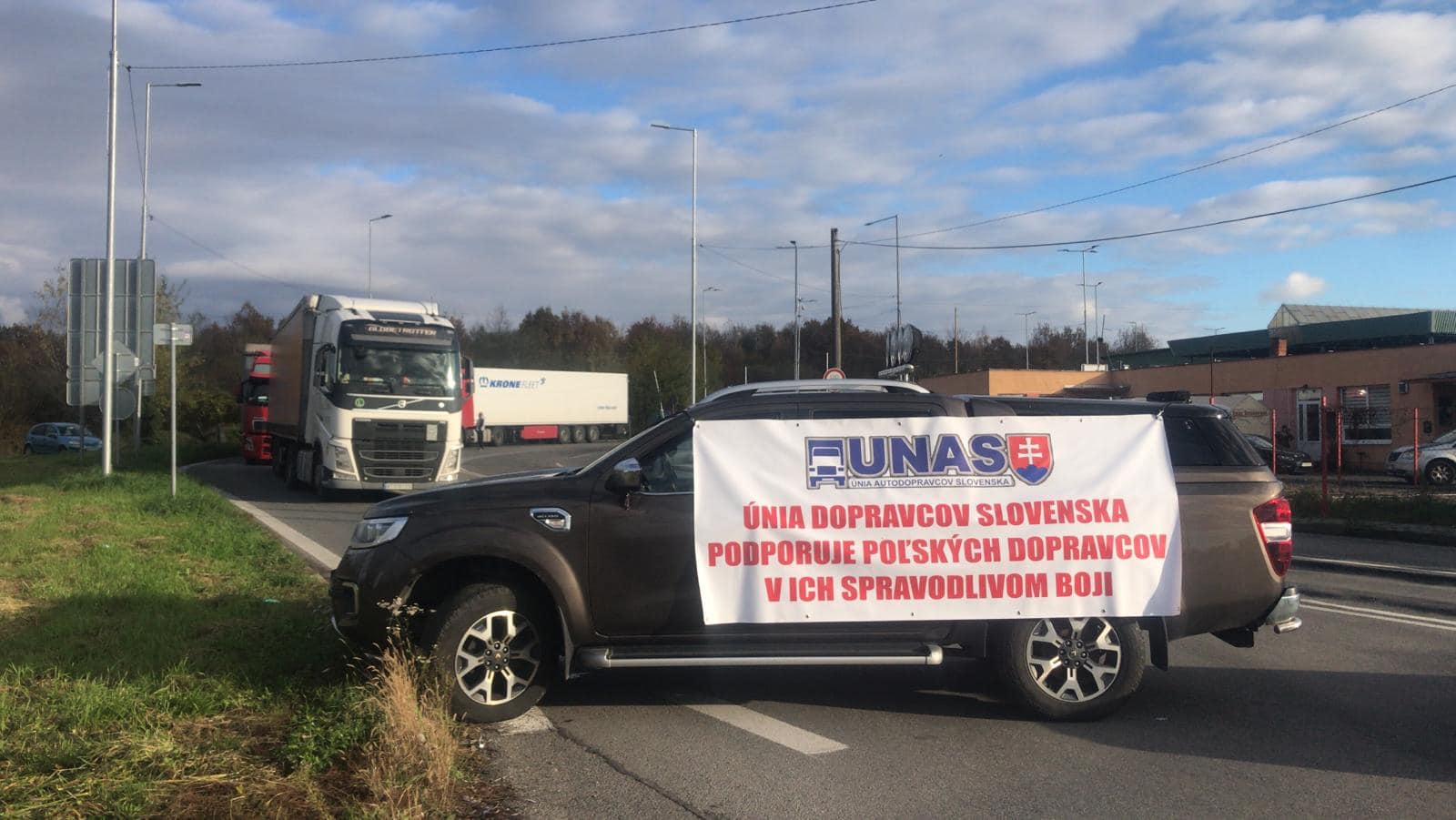Strike at border: Polish carriers demands, Ukrainian trucks blocked
 Photo: Ukrainian truckers are forced to queue for weeks at the border (Getty Images)
Photo: Ukrainian truckers are forced to queue for weeks at the border (Getty Images)
A few months after the farmers' protests, the border between Poland and Ukraine is again partially blocked. This time, three checkpoints have been blocked, causing truckers to stand in lengthy queues for weeks.
The article was based on the publications of the Polish media outlets Rzeczpospolita and RMF FM, statements by Adalbert Janz, representative of the European Commission, and Serhii Derkach, Deputy Minister of Community, Territorial and Infrastructure Development, as well as comments by Andrii Demchenko, spokesman for the State Border Guard Service.
What is going on at the border of Poland and Ukraine
As of the morning of November 20, nearly three thousand trucks were blocked in three directions. Andriy Demchenko, a spokesman for the State Border Guard Service of Ukraine, says that as of the afternoon, there is no updated information.
"According to Polish border guards, it is almost 2,900 trucks. Most of them are near the Krakovets checkpoint - almost 1200, near Yahodyn - almost 1100 and about 600 near Rava-Ruska," he told RBC-Ukraine.
The strikers allow a few trucks to pass in both directions per hour, but this does not solve the traffic problem. For example, before the blockade, up to 1,300 trucks crossed Yahodyn per day, and 600 trucks crossed Krakovets and Rava-Ruska each.
The blockade is also causing queues at other checkpoints to grow. In particular, in the morning, about 300 trucks were standing in front of Uhryniv, Ustyluh, and Smolnytsia, and about 1300 trucks were standing in front of the Shehyni checkpoint. The latter was suspended for some time today due to power outages.
"The protesters let several vehicles through. It can be 2-5-8 trucks per hour for entry and exit, and then two trucks per hour again. That is, we do not record the traffic intensity. The only thing we can say is that there is a certain intensity of traffic through Krakovets in the direction of leaving Ukraine," emphasized Demchenko.
 Photo: blockade of the border on the Polish side (facebook.com/KonfederacjaLublin)
Photo: blockade of the border on the Polish side (facebook.com/KonfederacjaLublin)
It should be noted that on the Ukrainian side, there is an electronic queue, and the trucks are not physically located near the border, but at gas stations and parking lots. On the Polish side, drivers are forced to stand in multi-kilometer-long queues for weeks.
The strikers are also threatening to launch a blockade at the Shehyni-Medyca checkpoint starting November 22. Despite the long queue, it is not currently blocked, and about 500 trucks passed through it yesterday.
"Of course, we have seen reports of a possible blockade in this direction as well, but we have no official confirmation yet. An increase in queues cannot be ruled out, given that Polish carriers have been blocking three checkpoints for two weeks, and the negotiations have led to nothing," the SBGS spokesman added.
The Ukrainian side has set up a support center to help drivers blocked at the border. A coordinator is assigned to each of the three points and is in constant communication. The Ukrtranssafety hotline at +38 (067) 120 0483 is also open around the clock.
The day before, it was reported that the initiative team had 11,000 food packages, drinking water, and essential medicines. Additional needs can be specified through the Google form.
If necessary, drivers can be evacuated to the territory of Ukraine.
Importantly, the restrictions do not apply to buses, cars, and pedestrian border crossing.
What do Polish carriers want?
The strike at the three checkpoints has been going on since November 6. According to the Polish carriers, they intend to block the border until January 3, 2024.
Their demands include:
- return of the practice of permits for Ukrainian carriers
- tightening of the ECMT (European Conference of Ministers of Transport) transportation rules by the Ukrainian side
- a ban on the registration of a carrier company in Poland if its financial activities are not carried out in the European Union
- a separate queue for vehicles with EU license plates
- a separate queue for empty trucks
- access to the Ukrainian "Shlyakh" system
Andriy Demchenko calls some of the requirements discriminatory.
"It concerns separate lanes for trucks with European license plates. And, of course, it concerns permits, which, in fact, is the abolition of the transport visa-free regime granted by the European Union," he said in his interview.
According to Rzeczpospolita, four trucks are currently allowed through the blocked crossing points in both directions. What is more, trucks with food, humanitarian, and military supplies are allegedly moving regularly.
"Chickens, bananas, and flowers are going to Ukraine without a queue. We don't want to starve them," says one of the protesters, who asked to remain anonymous.
 Photo: Polish carriers are making a number of demands that cannot be met (Getty Images)
Photo: Polish carriers are making a number of demands that cannot be met (Getty Images)
At the same time, Deputy Minister of Communities, Territories and Infrastructure Development of Ukraine Serhii Derkach said that the statements about the trucks with humanitarian cargo are not true.
"We have recorded numerous facts of fuel tanks and humanitarian aid standing in queues," he said, adding that the information has been passed on to the Polish authorities, and the Ukrainian side is waiting for explanations.
Polish carriers are complaining about the alleged loss of the market to Ukrainian companies. In particular, Polish drivers are paid 2500 euros per month, while Ukrainian drivers are paid 700 euros. Because of this, companies from Ukraine intercept orders.
"I was transporting goods from Poland to France for 1.15 euros (per kilometer - ed.), but I lost the order to a Ukrainian company that transports goods for 0.9 euros. Polish freight forwarders also use Ukrainian carriers for domestic transportation, although according to the EU-Ukraine transport agreement, Ukrainian cars can only travel in bilateral and transit traffic," says one of the blockade participants.
Moreover, according to their statements, competition from Ukraine affects not only Poland. Last week, Slovak carriers blocked the border near Uzhhorod for an hour as a warning. This week, they plan to move to daily actions. In addition to them, the demand to restore the permit system was supported by transport organizations in Hungary, Czechia, and Lithuania. They want the current agreement between Ukraine and the EU to be terminated or amended to allow for bilateral agreements between individual EU countries and Ukraine. According to them, this is allegedly why the number of illegal transportation operations in the EU market is increasing.
What's wrong with the requirement of access to the "Shlyakh" system
During the period of martial law and mobilization in Ukraine, which has been extended until February 14, 2024, men who are liable for military service cannot leave the country freely. In order for volunteers to transport humanitarian and medical supplies, they need to obtain a special permit. After that, the data is entered into the Shlyakh system, and border guards let the drivers out of Ukraine.
According to Andriy Demchenko, Polish carriers may be interested in hiring Ukrainians to work for their companies.
"So that they have the opportunity to cross the border to leave our country and work for Polish carriers as drivers since men are generally restricted from leaving Ukraine," he said.
Position of the European Commission
Last week, representatives of the European Commission visited one of the blocked crossing points. According to the European Commission's spokesperson Adalbert Janz, the consequences are already very significant.
"The queues at the borders are extremely long. The conditions for truckers are very difficult. There are also very significant economic consequences of this protest," he said, without giving specifics.
According to him, at this stage, it is difficult to assess the impact of the blockade on trade, particularly in the agricultural sector. At the same time, commenting on the Polish side's demand to return commercial permits for Ukrainian companies, he reiterated his earlier position.
"Any reintroduction of a system of permits or quotas for road transportation is legally impossible, as it would be incompatible with the EU-Ukraine Road Transport Agreement," he added, advocating for a Ukrainian-Polish dialogue.
 Photo: Slovak carriers may join the blockade of Polish carriers (facebook.com/KonfederacjaLublin)
Photo: Slovak carriers may join the blockade of Polish carriers (facebook.com/KonfederacjaLublin)
According to RMF FM, the European Commission may initiate a "punitive procedure" if Poland does not resolve the blockade of the border with Ukraine. According to Brussels, under EU law, Polish authorities are obliged to ensure the free movement of Ukrainian trucks at border crossings.
The negotiations failed. Will there be trial?
Three days after the blockade began, negotiations were held between the Polish authorities and the strikers. They ended without result. State Secretary Rafał Weber said that the government could not return the permits for the Ukrainian side at the request of the carriers.
Negotiations involving the Ministry of Community Development, Territories, and Infrastructure of Ukraine took place on November 13. According to Deputy Minister Serhii Derkach, two issues were resolved then: the allocation of separate lanes for empty trucks at the Yahodyn-Dorohusk checkpoint and the update of the eCherha system functionality with the ability to change drivers for empty trucks. In addition, it was proposed to run empty trucks through Uhryniv-Dolhobychuv, where the necessary lane is available.
Rafal Mekler, the organizer of the blockade at the Dorohusk checkpoint, said that the parties had not reached an agreement and that Ukraine allegedly "does not take the demands into account."
Derkach told RBC-Ukraine that the protesters do not represent the largest specialized associations in Poland, so it is difficult to establish contact with them. In Ukraine, it is believed that the blockade is taking place for political reasons, as the action is supported by the far-right Confederation party.
Recently it became known that Ukraine and Poland are preparing to sue the protesters. According to Volodymyr Balin, vice president of the Association of International Road Carriers (AsMAP), Ukraine has the support of Polish lawyers.
"The situation is actually critical, and today we are saying that we have legal support in Poland. The lawyers have been given two tasks. The first task is to unblock the situation as soon as possible. The second is to find out who is to blame and who will compensate for the damage. We are working on this together with our colleagues," he said during the telethon.
He also emphasized that the lawsuits should be filed in the near future. The Polish side has already reacted to the news.
"Ukrainians are threatening us with lawsuits for damages. The protest is legitimate, and if they sue the Polish state for compensation, this amount should be deducted from 500+ (a program of 500 zlotys per child in the families of Ukrainian refugees - ed.) or payments for Ukrainian citizens," Meckler wrote on his Facebook page.

